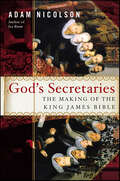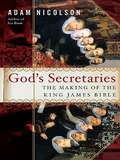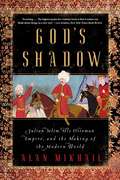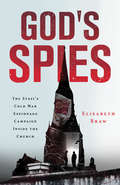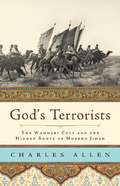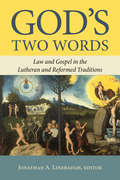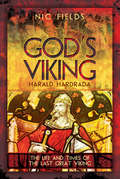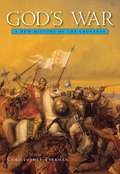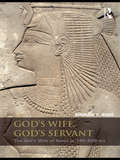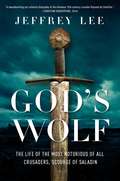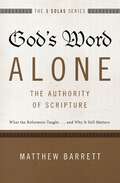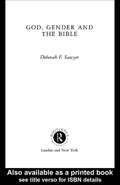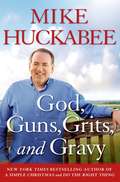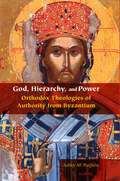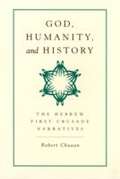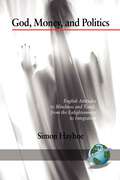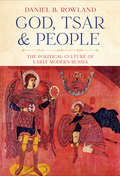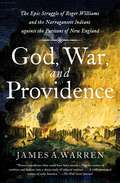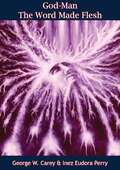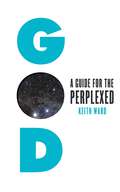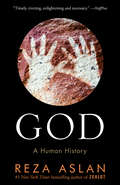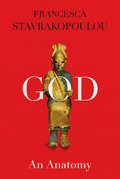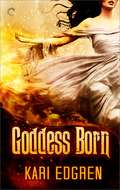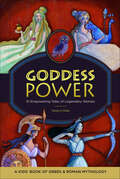- Table View
- List View
God's Secretaries: The Making of the King James Bible
by Adam NicolsonNATIONAL BESTSELLER • A NEW YORK TIMES NOTABLE BOOK“This scrupulously elegant account of the creation of what four centuries of history has confirmed is the finest English-language work of all time, is entirely true to its subject: Adam Nicolson’s lapidary prose is masterly, his measured account both as readable as the curious demand and as dignified as the story deserves.” — Simon Winchester, author of KrakatoaIn God's Secretaries, Adam Nicolson gives a fascinating and dramatic account of the era of the King James Bible and its translation, immersing us in an age whose greatest monument is not a painting or a building but a book.A network of complex currents flowed across Jacobean England. This was the England of Shakespeare, Jonson, and Bacon; the era of the Gunpowder Plot and the worst outbreak of the plague. Jacobean England was both more godly and less godly than the country had ever been, and the entire culture was drawn taut between these polarities. This was the world that created the King James Bible. It is the greatest work of English prose ever written, and it is no coincidence that the translation was made at the moment "Englishness," specifically the English language itself, had come into its first passionate maturity. The English of Jacobean England has a more encompassing idea of its own scope than any form of the language before or since. It drips with potency and sensitivity. The age, with all its conflicts, explains the book.This P.S. edition features an extra 16 pages of insights into the book, including author interviews, recommended reading, and more.
God's Secretaries: The Making of the King James Bible (P. S. Series)
by Adam NicolsonNicolson describes the group of black-gowned individuals who compared Bible translations and argued fine details between 1604 and 1611 to create the Bible we know today.
God's Shadow: Sultan Selim, His Ottoman Empire, And The Making Of The Modern World
by Alan Mikhail“A stunning work of global history. . . . Alan Mikhail offers a bold and thoroughly convincing new way to think about the origins of the modern world. . . . A tour de force.” —Greg Grandin Long neglected in world history, the Ottoman Empire was a hub of intellectual fervor, geopolitical power, and enlightened pluralistic rule. At the height of their authority in the sixteenth century, the Ottomans, with extraordinary military dominance and unparalleled monopolies over trade routes, controlled more territory and ruled over more people than any world power, forcing Europeans out of the Mediterranean and to the New World. Yet, despite its towering influence and centrality to the rise of our modern world, the Ottoman Empire’s history has for centuries been distorted, misrepresented, and even suppressed in the West. Now Alan Mikhail presents a vitally needed recasting of Ottoman history, retelling the story of the Ottoman conquest of the world through the dramatic biography of Sultan Selim I (1470–1520). Born to a concubine, and the fourth of his sultan father’s ten sons, Selim was never meant to inherit the throne. With personal charisma and military prowess—as well as the guidance of his remarkably gifted mother, Gülbahar—Selim claimed power over the empire in 1512 and, through ruthless ambition, nearly tripled the territory under Ottoman control, building a governing structure that lasted into the twentieth century. At the same time, Selim—known by his subjects as “God’s Shadow on Earth”—fostered religious diversity, welcoming Jews among other minority populations into the empire; encouraged learning and philosophy; and penned his own verse. Drawing on previously unexamined sources from multiple languages, and with original maps and stunning illustrations, Mikhail’s game-changing account “challenges readers to recalibrate their sense of history” (Leslie Peirce), adroitly using Selim’s life to upend prevailing shibboleths about Islamic history and jingoistic “rise of the West” theories that have held sway for decades. Whether recasting Christopher Columbus’s voyages to the “Americas” as a bumbling attempt to slay Muslims or showing how the Ottomans allowed slaves to become the elite of society while Christian states at the very same time waged the horrors of the transatlantic slave trade, God’s Shadow radically reshapes our understanding of the importance of Selim’s Ottoman Empire in the history of the modern world.
God's Spies: The Stasi's Cold War Espionage Campaign inside the Church
by Elisabeth BrawThe real-life cloak-and-dagger story of how East Germany&’s notorious spy agency infiltrated churches here and abroadEast Germany only existed for a short forty years, but in that time, the country&’s secret police, the Stasi, developed a highly successful &“church department&” that—using persuasion rather than threats—managed to recruit an extraordinary stable of clergy spies. Pastors, professors, seminary students, and even bishops spied on colleagues, other Christians, and anyone else they could report about to their handlers in the Stasi. Thanks to its pastor spies, the Church Department (official name: Department XX/4) knew exactly what was happening and being planned in the country&’s predominantly Lutheran churches. Yet ultimately it failed in its mission: despite knowing virtually everything about East German Christians, the Stasi couldn&’t prevent the church-led protests that erupted in 1989 and brought down the Berlin Wall.
God's Terrorists: The Wahhabi Cult and the Hidden Roots of Modern Jihad
by Charles AllenLondon historian Allen has specialized in Central Asia the British colonial period. Here he traces the history and development of the ideology that underpins a main stream of jihad today. Wahhabism, he explains, took shape in Arabia at the end of the 18th century and was brought to the Indian sub-continent early in the 19th. It was stamped out there ever and again, until it blossomed in Pakistan and Afghanistan in the late 20th century. Annotation ©2008 Book News, Inc. , Portland, OR (booknews. com)
God's Two Words: Law and Gospel in Lutheran and Reformed Traditions
by Jonathan LinebaughThe distinction between God&’s law and God&’s gospel lies at the core of the Lutheran and Reformed traditions—and has long been a point of controversy between them. God&’s Two Words offers new contributions from ten key Lutheran and Reformed scholars on the theological significance of the law-gospel distinction.Following introductory chapters that define the concepts of law and gospel from each tradition, contributors explore how the distinction between law and gospel plays out in theology, preaching, the reading of Scripture, and pastoral care. As it traces both the common ground and the areas of disagreement between the two traditions, this book amplifies and clarifies an important conversation that has been ongoing since the sixteenth century.CONTRIBUTORSMichael Allen Charles Arand Erik H. Herrmann Kelly Kapic Peter Malysz Mark C. Mattes Steven Paulson Katherine Sonderegger Scott Swain Kevin J. Vanhoozer
God's Two Words: Law and Gospel in Lutheran and Reformed Traditions
by Jonathan LinebaughThe distinction between God&’s law and God&’s gospel lies at the core of the Lutheran and Reformed traditions—and has long been a point of controversy between them. God&’s Two Words offers new contributions from ten key Lutheran and Reformed scholars on the theological significance of the law-gospel distinction.Following introductory chapters that define the concepts of law and gospel from each tradition, contributors explore how the distinction between law and gospel plays out in theology, preaching, the reading of Scripture, and pastoral care. As it traces both the common ground and the areas of disagreement between the two traditions, this book amplifies and clarifies an important conversation that has been ongoing since the sixteenth century.CONTRIBUTORSMichael Allen Charles Arand Erik H. Herrmann Kelly Kapic Peter Malysz Mark C. Mattes Steven Paulson Katherine Sonderegger Scott Swain Kevin J. Vanhoozer
God's Viking: The Life and Times of the Last Great Viking
by Nic FieldsAn epic historical biography of the Norwegian king who laid claim to the thrones of Denmark and England.Harald Hardrada is perhaps best known as the inheritor of “seven feet of English soil” in that year of fateful change, 1066. But Stamford Bridge was the terminal point of a warring career that spanned decades and continents. Thus, prior to forcibly occupying the Norwegian throne, Harald had an interesting (and lucrative) career in the Varangian Guard, and he remains unquestionably the most notable of all the Varangians who served the Byzantine emperors. In the latter employment he saw active service in the Aegean, Sicily, Italy, Anatolia, Syria, Palestine, and Bulgaria, while in Constantinople he was the hired muscle behind a palace revolution. A man of war, his reign in Norway was to be taken up with a wasteful, vicious, and ultimately futile conflict against Denmark, a kingdom (like England) he believed was his to rule. We follow Harald’s life from Stiklestad, where aged fifteen he fought alongside his half-brother, King Olaf, through his years as a mercenary in Russia and Byzantium, then back to Norway, ending with his death in battle in England.Praise for God’s Viking“A gripping story of the last great Viking who is remembered most for his boast to the Saxons that he had come to conquer their land and ended up with just enough to contain his body . . . . Most highly recommended.” —Firetrench
God's War: A New History of the Crusades
by Christopher TyermanGod's War offers a sweeping new vision of one of history's most astounding events: the Crusades. From 1096 to 1500, European Christians fought to recreate the Middle East, Muslim Spain, and the pagan Baltic in the image of their God. The Crusades are perhaps both the most familiar and most misunderstood phenomena of the medieval world, and here Christopher Tyerman seeks to recreate, from the ground up, the centuries of violence committed as an act of religious devotion. The result is a stunning reinterpretation of the Crusades, revealed as both bloody political acts and a manifestation of a growing Christian communal identity. Tyerman uncovers a system of belief bound by aggression, paranoia, and wishful thinking, and a culture founded on war as an expression of worship, social discipline, and Christian charity. This astonishing historical narrative is imbued with figures that have become legends--Saladin, Richard the Lionheart, Philip Augustus. But Tyerman also delves beyond these leaders to examine the thousands and thousands of Christian men-- from Knights Templars to mercenaries to peasants-- who, in the name of their Savior, abandoned their homes to conquer distant and alien lands, as well as the countless people who defended their soil and eventually turned these invaders back. With bold analysis, Tyerman explicates the contradictory mix of genuine piety, military ferocity, and plain greed that motivated generations of Crusaders. He also offers unique insight into the maturation of a militant Christianity that defined Europe's identity and that has forever influenced the cyclical antagonisms between the Christian and Muslim worlds. Drawing on all of the most recent scholarship, and told with great verve and authority, God's War is the definitive account of a fascinating and horrifying story that continues to haunt our contemporary world.
God's Wife, God's Servant: The God's Wife of Amun (ca.740–525 BC)
by Mariam F. AyadMariam F. Ayad explores how five women were elevated to a position of supreme religious authority. Drawing on a variety of textual, iconographic, and archaeological evidence, and containing fifty-one black and white and colour illustrations, the volume discusses this often neglected subject, placing the women within the broader context of the politically volatile, turbulent seventh and eighth centuries BCE.
God's Wolf: The Life Of The Most Notorious Of All Crusaders, Scourge Of Saladin
by Jeffrey Lee“[Jeffrey Lee] brings a blockbuster sensibility to this slice of the 12th century Levant.”—Dan Jones, Sunday Times (UK) In a 2010 terrorist plot, Al-Qaeda hid a bomb in a FedEx shipment addressed to a man who had been dead for 800 years. Born in twelfth-century France and bred for violence, Reynald de Chatillon was a young knight who joined the Second Crusade and rose through the ranks to become the preeminent figure in the crusader Kingdom of Jerusalem, chief foe of the Muslim leader Saladin, and one of the most reviled characters in Islamic history. In the West, Reynald has long been considered a minor player in the crusading saga, and is often dismissed as a bloodthirsty maniac who brought disaster on his fellow crusaders. However, by using contemporary documents and original research, Jeffrey Lee overturns this popular perception and questions other prejudices about the crusades that underlie modern misunderstandings of the Middle East. God’s Wolf shows how the crusader kingdom was brought down by a treacherous internal faction, rather than by Reynald’s belligerence. In fact, despite Reynald’s brutality, Lee argues that he was a strong military leader and an effective statesman, whose actions in the Middle East had a far-reaching impact that endures to this day. An epic saga set in the midst of a violent clash of civilizations, God’s Wolf is the fascinating story of an exceptional crusader and a provocative reinterpretation of the crusading era.
God's Word Alone---The Authority of Scripture: What the Reformers Taught...and Why It Still Matters (The Five Solas Series)
by R. Albert Mohler Jr. Matthew BarrettHistorians and theologians alike have long recognized that at the heart of the sixteenth-century Protestant Reformation were five declarations (or “solas”) that distinguished the movement from other expressions of the Christian faith. Five hundred years later, we live in a different time with fresh challenges to our faith. Yet these rallying cries of the Reformation continue to speak to us, addressing a wide range of contemporary issues. The Five Solas series will help you understand the historical and biblical context of the five solas and how to live out the relevance of Reformation theology today. In God’s Word Alone—The Authority of Scripture, scholar and pastor Matthew Barrett looks at the historical and biblical roots of the doctrine that Scripture alone is the final and decisive authority for God’s people. He examines the development of this theme in the Reformation and traces the crisis that followed resulting in a shift away from the authority of Scripture. Barrett shows that we need to recover a robust doctrine of Scripture’s authority in the face of today’s challenges and why a solid doctrinal foundation built on God’s Word is the best hope for the future of the church.
God, Gender and the Bible (Biblical Limits)
by Deborah SawyerDeborah Sawyer discusses this crucial yet unresolved question in the context of contemporary and postmodern ideas about gender and power, based on fresh examination of a number of texts from Hebrew and Christian scripture. Such texts offer striking parallels to contemporary gender theories (particularly those of Luce Irigaray and Judith Butler), which have unravelled given notions of power and constructed identity. Through the study of gender in terms of its application by biblical writers as a theological strategy, we can observe how these writers use female characters to undermine human masculinity, through their 'higher' intention to elevate the biblical God. God Gender and the Bible demonstrates that both maleness and femaleness are constructed in the light of divine omnipotence. Unlike many approaches to the Bible that offer hegemonist interpretations, such as those that are explicitly Christian or Jewish, or liberationist or feminist, this enlightening and readable study sustains and works with the inconsistencies evident in biblical literature.
God, Guns, Grits, And Gravy
by Mike HuckabeeThe New York Times Bestseller!<P><P> In God, Guns, Grits and Gravy, Mike Huckabee asks, "Have I been taken to a different planet than the one on which I grew up?" The New York Times bestselling author explores today's fractious American culture, where divisions of class, race, politics, religion, gender, age, and other fault lines make polite conversation dicey, if not downright dangerous. As Huckabee notes, the differences of opinion between the "Bubble-villes" of the big power centers and the "Bubba-villes" where most people live are profound, provocative, and sometimes pretty funny. Where else but in Washington, D.C. could two presidential golf outings cost the American taxpayers $2.9 million in travel expenses?<P> Government bailouts, politician pig-outs, and popular culture provocations from Jay-Z and Beyoncé to Honey Boo-Boo to the Duck Dynasty's Robertson family. Gun rights, gay marriage, the decline of patriotism, and the mainstream media's contempt for those who cherish a faith-based life. The trouble with Democrats, the even bigger trouble with Republicans, our national security complex, and how our Constitution is eroding under our noses. Stories of everyday Americans surviving tough times, reflections on our way of life as it once was, as it is, and as it might become…these subjects and many more are covered with Mike Huckabee's signature wit, insight, and honesty.<P> At times lighthearted, at others bracingly realistic, Huckabee's brand of optimistic patriotism highlights American ideals, offering a bright outlook for future generations.<P> With a wry eye for the ridiculous and a clear-eyed look at the most controversial issues of our time, God, Guns, Grits and Gravy is Mike Huckabee at his very best.
God, Hierarchy, and Power: Orthodox Theologies of Authority from Byzantium (Orthodox Christianity and Contemporary Thought)
by Ashley M. PurpuraIn the current age where democratic and egalitarian ideals have preeminence, Eastern Orthodox Christianity, among other hierarchically organized religious traditions, faces the challenging questions: “Why is hierarchy maintained as the model of organizing the church, and what are the theological justifications for its persistence?” These questions are especially significant for historically and contemporarily understanding how Orthodox Christians negotiate their spiritual ideals with the challenges of their social and ecclesiastical realities.To critically address these questions, this book offers four case studies of historically disparate Byzantine theologians from the sixth to the fourteenth-centuries—Dionysius the Areopagite, Maximus the Confessor, Niketas Stethatos, and Nicholas Cabasilas—who significantly reflect on the relationship between spiritual authority, power, and hierarchy in theoretical, liturgical, and practical contexts. Although Dionysius the Areopagite has been the subject of much scholarly interest in recent years, the applied theological legacy of his development of “hierarchy” in the Christian East has not before been explored.Relying on a common Dionysian heritage, these Byzantine authors are brought into a common dialogue to reveal a tradition of constructing authentic ecclesiastical hierarchy as foremost that which communicates divinity.
God, Humanity and History: The Hebrew First Crusade Narratives
by Robert ChazanThe crusader assaults on Rhineland Jewry in 1096 produced three remarkable Hebrew narratives that reflect the culture of early Ashkenazi Jewry in the vibrant environment of northern Europe.
God, Money, and Politics: English Attitudes to Blindness and Touch, from the Enlightenment to Integration
by Simon HayhoeHayhoe follows the British progression of the blind as immoral, to the need for rehabilitation, to questions of an educational nature.
God, Tsar, and People: The Political Culture of Early Modern Russia (NIU Series in Slavic, East European, and Eurasian Studies)
by Daniel B. RowlandGod, Tsar, and People brings together in one volume essays written over a period of fifty years, using a wide variety of evidence—texts, icons, architecture, and ritual—to reveal how early modern Russians (1450–1700) imagined their rapidly changing political world.This volume presents a more nuanced picture of Russian political thought during the two centuries before Peter the Great came to power than is typically available. The state was expanding at a dizzying rate, and atop Russia's traditional political structure sat a ruler who supposedly reflected God's will. The problem facing Russians was that actual rulers seldom—or never—exhibited the required perfection. Daniel Rowland argues that this contradictory set of ideas was far less autocratic in both theory and practice than modern stereotypes would have us believe. In comparing and contrasting Russian history with that of Western European states, Rowland is also questioning the notion that Russia has always been, and always viewed itself as, an authoritarian country. God, Tsar, and People explores how the Russian state in this period kept its vast lands and diverse subjects united in a common view of a Christian polity, defending its long frontier against powerful enemies from the East and from the West.
God, War, and Providence: The Epic Struggle of Roger Williams and the Narragansett Indians against the Puritans of New England
by James A. WarrenThe tragic and fascinating history of the first epic struggle between white settlers and Native Americans in the early seventeenth century: &“a riveting historical validation of emancipatory impulses frustrated in their own time&” (Booklist, starred review) as determined Narragansett Indians refused to back down and accept English authority.A devout Puritan minister in seventeenth-century New England, Roger Williams was also a social critic, diplomat, theologian, and politician who fervently believed in tolerance. Yet his orthodox brethren were convinced tolerance fostered anarchy and courted God&’s wrath. Banished from Massachusetts Bay Colony in 1635, Williams purchased land from the Narragansett Indians and laid the foundations for the colony of Rhode Island as a place where Indian and English cultures could flourish side by side, in peace. As the seventeenth century wore on, a steadily deepening antagonism developed between an expansionist, aggressive Puritan culture and an increasingly vulnerable, politically divided Indian population. Indian tribes that had been at the center of the New England communities found themselves shunted off to the margins of the region. By the 1660s, all the major Indian peoples in southern New England had come to accept English authority, either tacitly or explicitly. All, except one: the Narragansetts. In God, War, and Providence &“James A. Warren transforms what could have been merely a Pilgrim version of cowboys and Indians into a sharp study of cultural contrast…a well-researched cameo of early America&” (The Wall Street Journal). He explores the remarkable and little-known story of the alliance between Roger Williams&’s Rhode Island and the Narragansett Indians, and how they joined forces to retain their autonomy and their distinctive ways of life against Puritan encroachment. Deeply researched, &“Warren&’s well-written monograph contains a great deal of insight into the tactics of war on the frontier&” (Library Journal) and serves as a telling precedent for white-Native American encounters along the North American frontier for the next 250 years.
God-Man: The Word Made Flesh
by George W. Carey Inez Eudora PerryGeorge Washington Carey (1845-1924) was an American physician known for his 'chemistry of life' publications, a subject which he referred to as biochemistry. Carey combined a mixture of religion, astrology, physiology, anatomy, and chemistry, themed particularly with a mineral-based theory of human disease to explain his views on human chemistry. He continues to be popular within new-age and homeopathic circles. In the context of a person viewed as a "human molecule", Carey was the first to state that a person's body is a "chemical formula in operation." Partial Contents: Redemption of Humanity; The Kingdom at Hand; Books Rejected by the Council of Nicea; Man was Made Upright; The Eternity of Perfection; God's Word Revealed; Great Pyramid; Optic Thalamus; The central or Single Eye; The Solar Plexus; Prophecies Fulfilled; Sacred Books of the East; The Mystery of Santa Claus Revealed; The Revelation of Hermes; The Secret Doctrine; Reincarnation; The United States Seal; Glossary.-Print ed.
God: A Guide for the Perplexed
by Keith WardIn God: A Guide for the Perplexed, bestselling author Keith Ward has crafted a unique, perceptive, witty, and informative introduction to the mysteries of the divine.From the essential truths presented in ancient Greek mythology via the stories about Olympian gods, through the key ideas of major philosophers such as Nietzsche and Marx, to the surprise insights offered by such diverse elements of our experience as Romantic poetry and the film 'Alien', Ward draws on everything that has either directly or remotely influenced our knowledge of a higher force. His book therefore provides not only a multi-disciplinary and comprehensive account of the different manifestations of God, but, most importantly, offers a humorous and engaging encounter with both humanity's belief in God and our exploration of that belief. Mixing the eclectic with the sublime, this illustrated and profound volume will be a compulsive page-turner for anyone interested in the real core of the philosophical and spiritual quest for meaning.
God: A Human History
by Reza AslanThe #1 New York Times bestselling author of Zealot and host of Believer explores humanity’s quest to make sense of the divine in this concise and fascinating history of our understanding of God. In Zealot, Reza Aslan replaced the staid, well-worn portrayal of Jesus of Nazareth with a startling new image of the man in all his contradictions. In his new book, Aslan takes on a subject even more immense: God, writ large. In layered prose and with thoughtful, accessible scholarship, Aslan narrates the history of religion as a remarkably cohesive attempt to understand the divine by giving it human traits and emotions. According to Aslan, this innate desire to humanize God is hardwired in our brains, making it a central feature of nearly every religious tradition. As Aslan writes, “Whether we are aware of it or not, and regardless of whether we’re believers or not, what the vast majority of us think about when we think about God is a divine version of ourselves.” But this projection is not without consequences. We bestow upon God not just all that is good in human nature—our compassion, our thirst for justice—but all that is bad in it: our greed, our bigotry, our penchant for violence. All these qualities inform our religions, cultures, and governments. More than just a history of our understanding of God, this book is an attempt to get to the root of this humanizing impulse in order to develop a more universal spirituality. Whether you believe in one God, many gods, or no god at all, God: A Human History will challenge the way you think about the divine and its role in our everyday lives.Advance praise for God “Breathtaking in its scope and controversial in its claims, God: A Human History shows how humans from time immemorial have made God in their own image, and argues that they should now stop. Writing with all the verve and brilliance we have come to expect from his pen, Reza Aslan has once more produced a book that will prompt reflection and shatter assumptions.”—Bart D. Ehrman, author of How Jesus Became God “Reza Aslan offers so much to relish in his excellent ‘human history’ of God. In tracing the commonalities that unite religions, Aslan makes truly challenging arguments that believers in many traditions will want to mull over, and to explore further. This rewarding book is very ambitious in its scope, and it is thoroughly grounded in an impressive body of reading and research.”—Philip Jenkins, author of Crucible of Faith
God: An Anatomy
by Francesca StavrakopoulouAn astonishing and revelatory history that re-presents God as he was originally envisioned by ancient worshippers—with a distinctly male body, and with superhuman powers, earthly passions, and a penchant for the fantastic and monstrous."[A] rollicking journey through every aspect of Yahweh&’s body, from top to bottom (yes, that too) and from inside out ... Ms. Stavrakopoulou has almost too much fun.&”—The Economist The scholarship of theology and religion teaches us that the God of the Bible was without a body, only revealing himself in the Old Testament in words mysteriously uttered through his prophets, and in the New Testament in the body of Christ. The portrayal of God as corporeal and masculine is seen as merely metaphorical, figurative, or poetic. But, in this revelatory study, Francesca Stavrakopoulou presents a vividly corporeal image of God: a human-shaped deity who walks and talks and weeps and laughs, who eats, sleeps, feels, and breathes, and who is undeniably male. Here is a portrait—arrived at through the author's close examination of and research into the Bible—of a god in ancient myths and rituals who was a product of a particular society, at a particular time, made in the image of the people who lived then, shaped by their own circumstances and experience of the world. From head to toe—and every part of the body in between—this is a god of stunning surprise and complexity, one we have never encountered before.
Goddess Born
by Kari EdgrenPennsylvania, 1730Selah Kilbrid keeps a dangerous secret: she has the power to heal.A direct descendent of the Celtic goddess Brigid, it's Selah's sacred duty to help those in need. But as the last of the Goddess Born living in the New World, she learned from an early age to keep her supernatural abilities hidden. The Quaker community of Hopewell has always been welcoming, but there's no doubt they would see her hanged if her gift was revealed.When a prominent minister threatens to try her with witchcraft unless she becomes his wife, Selah has only one hope-that her betrothed, a distant cousin from Ireland, arrives as planned. Marrying Samuel would keep her secret safe, preserve her sacred bloodline, and protect her from being charged as a witch.But when news of Samuel's death reaches the Colonies, Selah is truly on her own. Terrified, she faces an impossible choice-forfeit her powers and marry the loathsome Nathan? Or find an imposter to pose as her husband and preserve her birthright?111,000 words
Goddess Power: 10 Empowering Tales of Legendary Women
by Yung In ChaeLet the goddesses take you on an odyssey—10 tales about Greek mythology for kids ages 9 to 12The goddesses of classical mythology ruled the heavens, mingled with mortals, and overcame tremendous odds. Goddess Power: A Kids' Book of Greek and Roman Mythology takes you on an extraordinary journey through the triumphs and tragedies of these remarkable women.From Gaia, Goddess of Earth, to Aphrodite, Goddess of Love and Beauty, these legendary ladies' stories are paired with stunning artwork that brings the myths to life. How will you be inspired by these tales about Greek mythology for kids?In this book of Greek mythology for kids, you'll find:Creature encyclopedia—Uncover the wondrous beasts of classical mythology—from Cerberus, the three-headed dog, to Typhon, a giant with fire-breathing snakes on his shoulders.Greek pronunciation guide—Find a helpful guide to pronouncing the tongue-twisting names, places, and other words found in these stories about Greek mythology for kids.Symbols and strengths—Discover what each goddess is known for and where she comes from—like Athena, the goddess of wisdom and warfare, whose symbols are an olive tree, an owl, a spear, and a shield.Explore the mysteries and lessons of life with the enchanting goddesses in this beautifully illustrated book about Greek mythology for kids.
